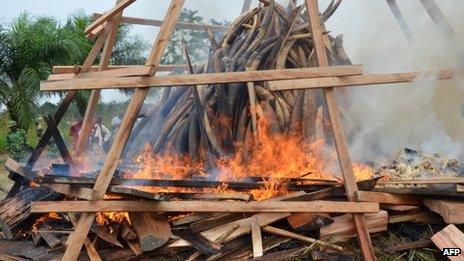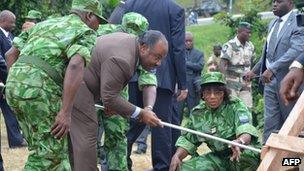Gabon torches illegal ivory in fight against poachers
- Published

The ivory stockpile resulted from the killing of some 850 elephants
Gabonese President Ali Bongo has set on fire nearly five tonnes of illegal ivory worth $9.3m (£6m) as part of attempts to deter poaching.
Mr Bongo said the burning was meant to send a "strong signal" to those who still traded in ivory.
Conservation group WWF has welcomed the move, saying it was an "indication of the country's commitment" to curbing elephant poaching and the ivory trade.
Trading in ivory is mostly illegal.
Exceptions have been made for ivory obtained legally, for example from animals killed as part of official culls to control local populations.
The pyre that was kindled in the Gabonese capital, Libreville, represented the central African nation's entire government stockpile of confiscated ivory, which resulted from the killing of some 850 elephants.
Mr Bongo said: "Gabon has a policy of zero tolerance for wildlife crime and we are putting in place the institutions and laws to ensure this policy is enforced.
"We don't want our children to inherit an empty forest. For that reason, we cannot allow this trafficking to continue."
The stock destroyed amounted to 4,825kg, including 1,293 pieces of rough ivory mainly composed of tusks and 17,730 pieces of worked ivory, the WWF said in a statement.

President Ali Bongo said his country had a policy of "zero tolerance for wildlife crime"
"We believe this is a strong signal of intent by Gabon against poaching and illegal wildlife trade - at a time of intense poaching pressure in central Africa, where the illegal killing of elephants for ivory is at record levels," it added.
The BBC's Charles Mavoungou in Libreville says the discovery of about 20 elephant carcasses in April last year in two national parks in the north of the country enabled the authorities to identify trafficking rings working across Cameroon, Chad, Congo and Sudan.
Since the elephant massacre, wildlife security has been improved with park guards increased from 70 to 400 and the formation of a special 250-strong brigade of the paramilitary police for the national parks, he adds.
- Published12 April 2012
- Published12 April 2012